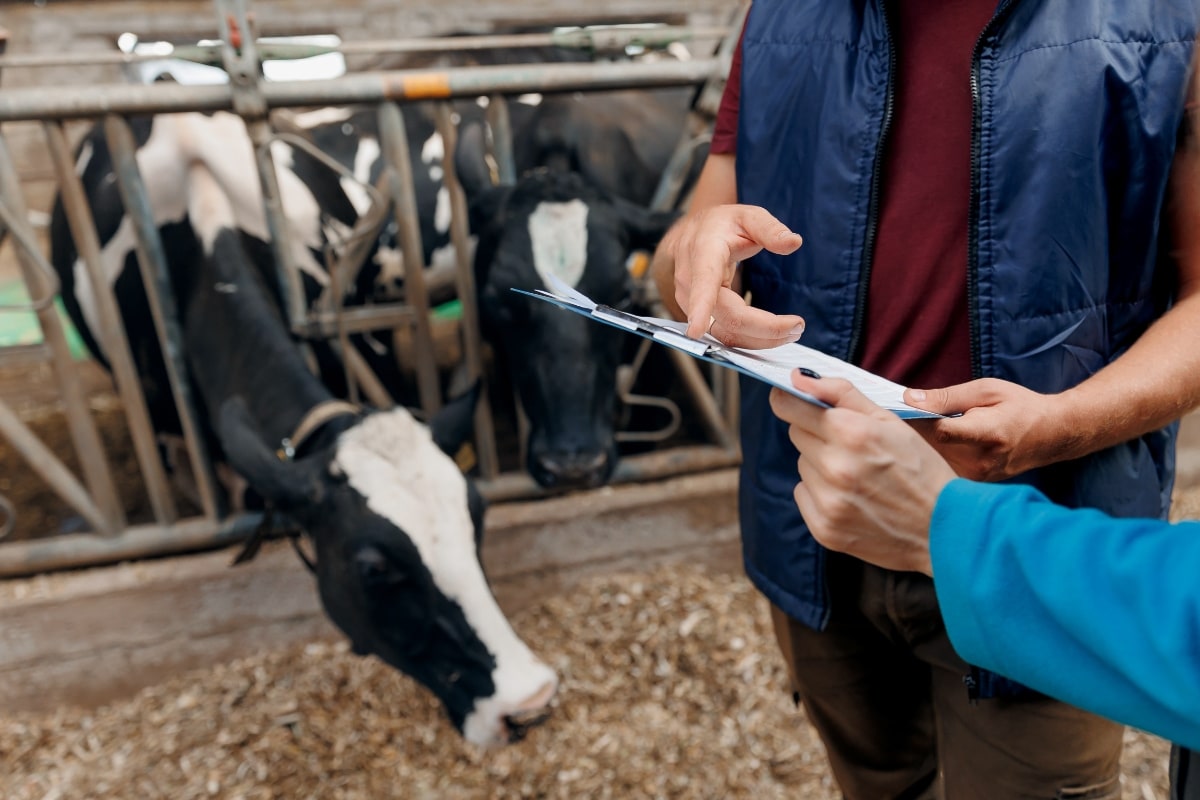Nutrition and management play critical roles in cow fertility issues. While you should also work on the herd’s genetics, neglecting other factors can also lead to poor calving success. Cattle fertility problems can cut into profits quickly, especially when one pregnancy is worth $200–$600, according to the Dairy Cattle Reproduction Council. So, improving your dairy cattle feed and other factors is well worth it to protect the success of your operation.
How to Improve Cow Fertility
Nutrition, management, and environmental conditions all contribute to cattle fertility problems. By improving each area, you can help your dairy cows’ fertility reach its full potential.
Consider Herd Health
Postpartum disorders such as mastitis, lameness, digestive problems, metritis, retained placenta, and others can negatively impact a cow’s pregnancy. Cows diagnosed with a disorder after calving and before the next artificial insemination (AI) are 7–10% less likely to conceive, as noted by Pennsylvania State University.
Keeping up with vaccinations and regular veterinarian checkups can also help improve pregnancy success during the breeding season. As two prominent examples, chronic leptospirosis and bovine viral diarrhea (BVD) can contribute to embryonic loss and infertility.
Focus On Genetics
While breeding for fertility is a long-term strategy, the payoff is well worth it. If your herd has a relatively low genetic level for fertility, you’ll need to compensate with a high level of management and feed quality. So, raising your herd’s genetic level can make it easier to achieve consistent pregnancy rates and minimize the time needed for cows to get pregnant again.
Select only the best bulls for AI to improve the genetics for the most important factors, including fertility traits. Likewise, you can explore crossbreeding to improve fertility above the breed’s average of both parents.
Minimize Environmental Stressors
Environmental stressors can reduce fertility in dairy cows by disrupting the delicate hormonal balance required for a healthy pregnancy. Ensuring comfort for your herd will pay off with an improved conception rate.
- Heat stress: Once overheated, cows will consume less feed, leading to a decline in fertility for both male and female cattle. They’ll use vital micronutrients faster and suffer adverse fertility effects, according to the University of Wisconsin.
- Overcrowding: Cows require around 12 to 14 hours of daily lying time. If the barns or pens are overstocked, social stress will lead to reduced feed intake and chronic stress. Overstocking can lead to a drop in conception rate of 0.1% for every 1% increase in overstocking.
- Poor ventilation: Ammonia buildup or excessive humidity can also be stressful for cattle, indirectly affecting their fertility.
Improve Energy Balance in Early Lactation After Calving
High-producing lactating cows usually experience negative energy balance (NEB) during early lactation after calving. This is when energy output in milk exceeds energy intake from feed. Cow’s dry matter intake (DMI) lags behind the required energy, contributing to reduced fertility, according to Michigan State University.
Excessive body condition score (BCS) loss during the first 30 days of milk yield is associated with delayed ovulation. So, the goal should be to keep the BCS loss lower than 0.5 BCS during early lactation.
| BCS loss | First ovulation after calving |
|---|---|
| < 0.5 | 30 days |
| 0.5-1.0 | 36 days |
| >1.0 | 50 days (with a significantly reduced probability of pregnancy) |
The Cattle Site notes that BCS loss after calving is associated with health and fertility issues, while maintenance or even improvement in BCS after calving is associated with fewer health problems. Their review of research shows that it’s critical to calve cows with a BCS between 2.75 and 3.0, while getting cows quickly pregnant after the voluntary waiting period.
Adequate DMI with energy-dense feeds will help reduce the BCS loss and support the timely restoration of energy balance.
Ensure Adequate Protein Levels
What happens when a cow doesn’t get enough protein during peak milk production, when her body is already under stress and using every available nutrient just to keep up? Her body may decide not to start growing a fetus at the same time, says Michigan State University.
Multiple studies suggest that fertility improves after calving when cows receive enough amino acids to support both maintenance and milk production. That’s why it’s essential to provide adequate protein and energy during early lactation, including a balanced supply of key amino acids.
Use Mineral And Vitamin Supplements
Both macro and micro minerals play critical roles in cattle health and fertility. If your cows are deficient in crucial cow fertility minerals, they will likely have reduced conception rates.
Besides macro minerals like magnesium, calcium, and phosphorus, a lack of trace minerals such as selenium, zinc, iodine, manganese, and copper can affect fertility and overall health. In particular, selenium is among the most critical for fertility (but others shouldn’t be ignored either). Selenium deficiency around calving is linked to metritis, retained placenta, and subsequent poor fertility.
Beta-carotene supports the ovarian cycle in cows by suppressing oxidative stress, contributing to improved fertility and conception rates. This well-established nutrient has strong evidence linking it to improved conception. One study demonstrated a 44% increase in fertility with beta-carotene supplementation compared to a control group, both of which experienced AI failures.
Prevent Nutritional Imbalance
Protein, carbs, fats, fiber, and micronutrients must be balanced. While all are important, if your cows are overfed or deficient in any of them, their fertility and health may decline. Therefore, it’s absolutely critical to have a well-balanced animal feed.
You can easily miss a key piece of the puzzle with pasture grazing, silage, custom formulas, supplements, and feed management. That’s why you should work with a feed provider like Star Blends that can partner with your nutritionist to provide custom formulas that are well-rounded for your particular herd needs.
Ensure Consistent Feeding Management
If cows aren’t used to a predictable feeding schedule, they’ll get stressed and gorge on feed once available. Neither is good for fertility, health, or productivity. Consistent feeding management prevents metabolic ups and downs, ensures a more stable body condition and hormone balance, and allows you to better track what works. You should:
- Provide feed on a routine schedule to create a consistent feeding habit in your herd.
- Maintain feed availability throughout the day.
- Push up feed multiple times per day to provide uniform feed composition.
- Always mix rations as noted by your nutritionist.
- Analyze your feed rations on schedule to avoid sudden feed quality shifts.
Feed Smarter, Breed Better with Custom Nutrition from Star Blends
Poor reproductive performance can significantly affect herd profitability, and the solution often starts in the feed bunk. Star Blends works directly with your nutritionist to fine-tune feed blends that support cow fertility. Reach out to our team today to discuss how a custom blend could help keep your herd on track.



